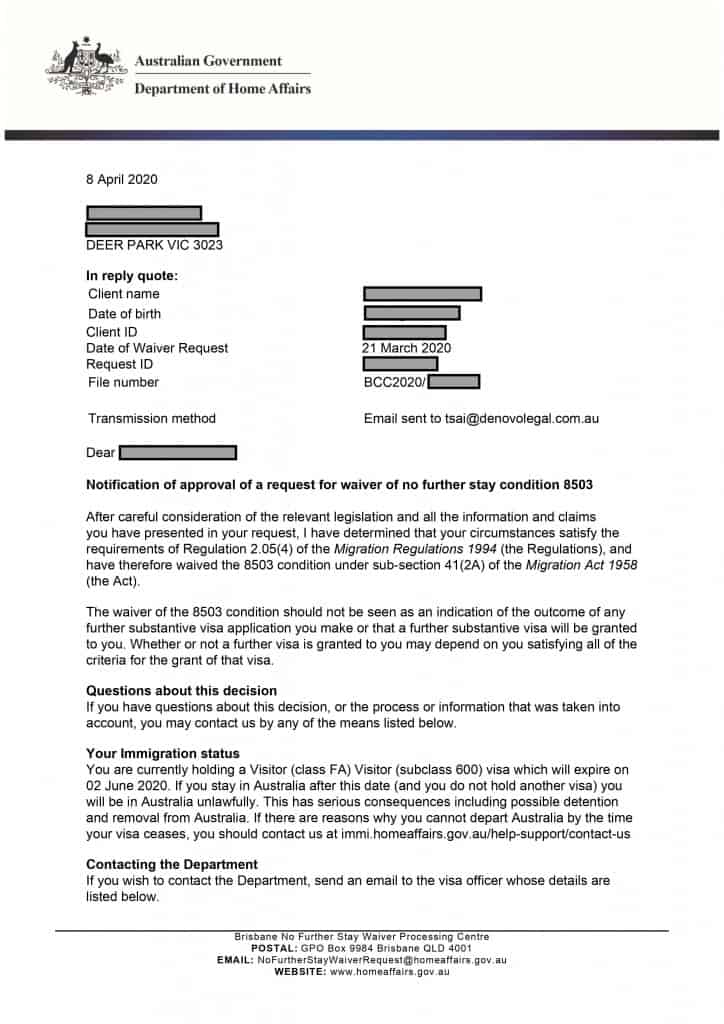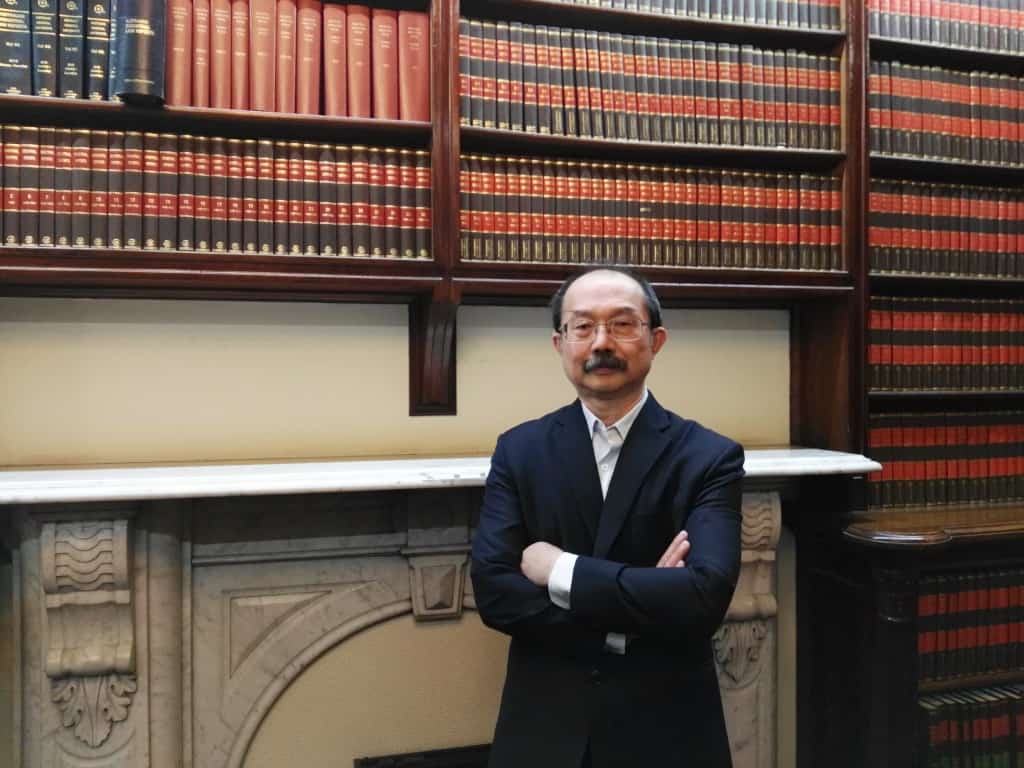
COVID-19 and visa holders – what you can and can’t do. From 25 March 2020, permanent residents holding a PR visa are restricted from travelling overseas unless they are ordinarily resident in another country.
COVID-19 and visa holders – from 23:59 AEDT on 28 March 2020, Subclass 444 (click here to learn more) visa holders who normally reside (and not transiting) in Australia and permanent residents holding a PR visa entering Australia will be required to undertake mandatory 14-day quarantine at designated facilities upon their arrival in Australia.
COVID-19 and visa holders – if you are an immediate family member of an Australian citizen or PR you may enter Australia if you holds a valid visa. Immediate family members are:
- Spouses or de facto partners
- Dependent children
- Legal guardians
COVID-19 and visa holders – if you do not hold a Partner Subclass 100, 309, 801, 820 or Child Subclass 101, 102, 445 visa, you cannot come to Australia unless you are granted an exemption.
If you are transiting in Australia to return home to certain countries, you do not need to apply for an exemption. If you have travelled to China, Iran, South Korea or Italy in the last 14 days, you will not be allowed to transit in Australia.
In Australia
COVID-19 and visa holders currently in Australia. If you holds an Australian visa and you are an ordinarily resident in another country other than Australia, you can leave Australia if it is safe and possible to do so. If you are not an Australian PR and you leave Australia, you may not be permitted to return until the ban is lifted.
If you are in Australia and your current visa is about to expire, you should apply for a new visa. When you apply for a new visa, you might be granted a bridging visa to allow you to stay lawfully until a decision is made on your visa application.
If you are current visa will expired in the next 28 days or has expired less than 28 days ago, you may be able to apply for the COVID-19 pandemic event visa (click here to learn more).
Must not remain beyond stay period permitted
If your visa has condition 8531 or must not remain in Australia beyond the period of stay permitted by the visa and you cannot return to your home country, you will need to apply for a new visa before your visa expired, for eg, COVID-19 pandemic event visa.
Affected by No Further Stay condition
If your current visa has a No Further Stay or condition 8503 or 8534 or 8535, you will not be able to apply for another visa while you are in Australia. In order for you to be able to apply for a new visa, you must request the Department to waive this condition (click here to learn more). Only when the No Further Stay condition is removed you can apply for a new visa.

Affected by Cannot Stay for more than 12 months in any 18 months
If your current visa has condition 8558 or non-resident cannot stay for more than 12 months in any 18 months period, you will need to apply for a new visa. If you remained in Australia for more than 12 cumulative months in an 18 month period, your visa remains valid until the visa expiry date.
Visa has expired
If your visa has expired, you will need to apply for Bridging Visa E (click here to learn more) in order to remain lawfully.
Complying with visa conditions
If you cannot provide additional information due to temporary COVID-19 closure, including health check or police clearances or biometrics or English Language testing, the Department you will be given additional time to provide.
COVID-19 and student visa holders – if you cannot complete your Australian Study Requirement or periods of stay under the regional visa scheme for Temporary graduate visa holders, the Department may provide concessions on a case-by-case basis.
Condition 8303 – not become involved in disruptive activities
If your visa has condition 8303, you must not become involved in activities disruptive to, or violence threaten harm to, the Australian community or a group within the Australian community.
If you do not adhere to the social distancing rules may cause you to breach condition 8303 as the violation may be considered as being involved in activities which are disruptive to the Australian community.
A breach of condition 8303 may be grounds for visa cancellation under s 116.
Visa cancellation
If your visa is cancelled in response to the temporary travel restrictions, the Department will write to you and provide information on how to seek revocation of the visa cancellation.
Facing severe financial hardship
If you are in severe financial hardship because you have limited savings of less than $5,000, you earn less than the highest Special Benefit fortnightly payment of $ 565.70 and you cannot improve your financial position.
You may apply to Centrelink for Special Benefit payment if you are in severe financial hardship for reasons beyond your control, eg COVID-19 pandemic, you are unable to earn enough to support yourself and your family, and you are unable to get another income support. If you are eligible for this benefit, you will be paid the same amount as JobSeeker payment or youth allowance.
If you are not eligible for Special Benefit payment, you may be able to claim relief from Red Cross. Red Cross will decide on the eligibility for receiving the service which is funded by the Australian government for 6 months. Preference will be given to people with most urgent needs first.
Temporary visa holders are eligible for benefit
You do not need to be an Australian resident to eligible for limited payments and concessions if you hold:
- Subclass 060 Bridging Visa F
- Subclass 070 Bridging Visa Pending Removal
- Subclass 309 Offshore Partner
- Subclass 444 SCV (including non-protected SCV – arrived after 26 Feb 2001)
- Subclass 449 Humanitarian Stay
- Subclass 491 Skilled Work Regional (pending approval)
- Subclass 494 Skilled Employer Sponsored Regional (pending approval)
- Subclass 785 TPV
- Subclass 786 Humanitarian Concern
- Subclass 790 SHEV
- Subclass 820 Onshore Partner
Tasmania
If you are living in Tasmania and you can demonstrate immediate financial hardship, you may be eligible for $250 for individual, and $1,000 for families.
Victoria
Victoria has provided a $45m funding through the International Student Emergency Relief Fund giving up to $1,100 to students who have lost their job or had a significant reduction to their working hours.
Students can also access rent relief and are eligible for the Working for Victoria initiative which help them to find new employment.
South Australia
SA government will provide up to $13.8m to assist international student studying in the state.
Students studying at the University of Adelaide, Flinders University and University of SA will be able to access the International Student Support Package.
An emergency cash grant of $500 is also available to international students who are significantly impacted by COVID-19.
ACT
ACT is providing up to $450,000 for emergency relief services to support students who have lost their income because of their employers shutdowns.
Queensland
The QLD government is providing up to $2.2m to help international students. The support covers access to professional support counsellors, isolation care-packs, pre-prepared meals and living expense payments.
Western Australia
The WA government is providing StudyPerth Crisis Relief support to international students studying in WA to access emergency accommodation, supplies and healthcare.
Northern Territory
International students studying in NT will receive support through NT’s Jobs Rescue and Recovery program provided to businesses if they employment is affected by COVID-19.
StudyNT in the form of care packages are also available.
Student visa holders may work more than 40 hours during COVID-19 pandemic
If you are holding a student visa, you may be permitted to work more than 40 hours per fortnight. However, you no not need to apply for your working hours to be increased. You should contact your employer.
- Student visa holders enrolled in a nursing course can undertake work in the health care facilities
- Student visa holders already in their existing roles working in a major supermarkets such as Coles and Woolworths, stocking shelves
- Student visa holders working in an aged care facility
The Department will inform your employer with a letter to confirm that your visa will not be cancelled if you worked more than 40 hours per fortnight. Your employer will also be informed when this temporary arrangement will end.
If you are working in one of the above and for more than 40 hours per fortnight, you are still required to satisfy academic performance and class attendance.
You should note that your employer must be registered and has received a letter of authorisation to allow you to work more hours.
Masters by research or doctorate course
If you are enrolled in a Master by research or PhD course, you may work unlimited work.
Course has been deferred
If your school has deferred your course, you can work over 40 hours per fortnight.
Students affected by travel ban
If you are unable to enter Australia due to the COVID-19 travel ban, you should contact your education provider to deter your study. This will not affect your student visa.
If you requires more time to complete your studies beyond your visa expiry, you will need a new CoE, OSHC and apply for a new student visa.
You should note that student visas cannot be extended. You will need to apply for a new visa.
Holding a 457 or 482 visa
If you are holding a TSS 482 or Temporary Work 457 visa and you have been stood down by your sponsor/employer but not laid off, your visa will remain valid. Your sponsor will be able to extend your visa.
If your sponsor reduced your working hours, you will not be in breach of your visa conditions or your employer breached their sponsorship obligations.
If your employment has been terminated, you should find another sponsor/employer within 60 days or leave the country or apply for another visa, eg, COVID-19 pandemic event visa (click here to learn more).
Working Holiday Maker visa
If you are on a Working Holiday Maker visa, this visa cannot be extended. If you have completed 3 or 6 months of specified work, you may be able to apply for a second or third Working Holiday Maker visa.
If you are working in a critical sector like agriculture or health or aged and disability care or childcare, you will be exempted from the 6 month work limitation with 1 employer.
If you have not completed the 3 or 6 of specified work required to apply for a second or third Working Holiday Maker visa, and you are unable to return to your home country because of the COVID-19 travel restrictions, you may apply for the COVID-19 pandemic event visa. This visa will allow you continue working, if you wish to do so, or depart Australia when it is safe to do so.
Condition 8547 – 6 month work limitation
If you are on a Working Holiday Maker visa, you are usually limited to working for 1 employer for more than 6 months. This may be waived if the Department has given you the permission to work longer than 6 months.
If you are working in critical sectors like health, aged care or agriculture, you have permission from the Department to work for the same employer for longer than 6 months on grounds of exceptional, unforeseen circumstances. Similarly, if you may work more than 6 months in:
- Different locations and work in any 1 location does not exceed 6 months
- In plant and animal cultivation anywhere in Australia
- In certain industries in northern Australia
- Assisting bushfire recovery efforts
If you have not completed the 3 or 6 months of specified work required to apply for a second or third Working Holiday Maker visa because of COVID-19 and you are not working in a critical sector, you will have to apply for another visa or return home.
Seasonal worker or Pacific Labour Scheme
If you are holding a Subclass 403 visa under the Pacific Labour Scheme, you can apply for another Subclass 403 to continue working, if you wish to do so.
If your Subclass 403 visa cannot be extended, you may be able to apply for the COVID-19 pandemic event visa.
Changing employer & No Further Stay
If your Subclass 403 visa has condition 8557 (Changing Employers), it means you can only work for 1 sponsor/approved employer, unless you have the Department’s permission to change employer.
During the COVID-19 pandemic, you will be able to change sponsors/approved employers. If you are a Seasonal Worker, your employer must contact the Department of Education, Skills and Employment or if you are working in the Pacific Labour Scheme, contact the Department of Foreign Affairs and Trade.
If your visa has condition 8503 or No Further Stay, it will be automatically waived during the COVID-19 pandemic to allow you to apply for the COVID-19 pandemic event visa.
Bridging visa holders
COVID-19 and visa holders – if you departed Australia on a Bridging Visa B and you are now prevented from returning to Australia, you must apply for a new visa if your Bridging Visa B has expired to return to Australia. However, you cannot apply for another Bridging Visa B to return to Australia as this visa cannot be granted if you are outside Australia.
If your Bridging Visa does not allow you to work, you will need to apply for a Bridging Visa A that will allow you to work. You will need to demonstrate you are in a difficult financial situation. However, this does not apply if your current Bridging Visa A was granted to you because you have applied for judicial review of the decision made on your original visa application or you have applied for a protection visa.
Australian migration law is complex and difficult to understand, contact our immigration lawyer for a consultation (fee applies) to help you with any COVID-19 and visa holders questions.

 041 222 4020 or WeChat: AUDvisa
041 222 4020 or WeChat: AUDvisa
This article is not intended to be or taken as migration legal advice. The author of this article disclaims any liability for any action or omission on the information provided or not provided in this article. You should always consult an immigration lawyer or a registered migration agent to form an informed opinion on your immigration matter.



